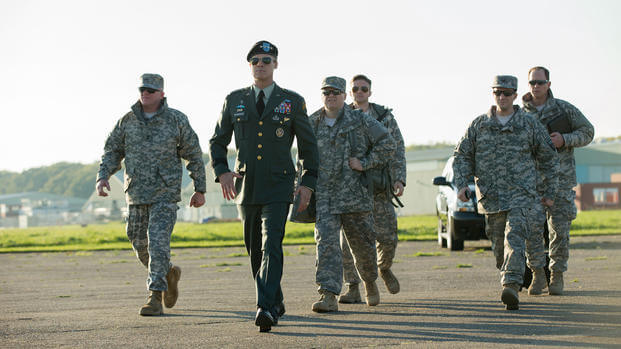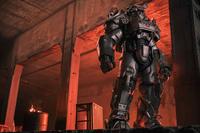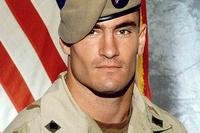War Machine is a Netflix movie starring Brad Pitt and directed by David Michôd. It's very loosely based on Rolling Stone journalist Michael Hastings' book The Operators: The Wild & Terrifying Inside Story of America’s War in Afghanistan, which in turn is an expansion of the notorious Rolling Stone article that effectively ended the career of General Stanley McChrystal.
Brad plays a fictional general named Glen McMahon. Writer-director Michôd uses the outline of McChrystal's story to create a satire that's both far more outrageous than Hastings' book and far more sympathetic to the ideals that motivate his lead character. It's complicated: while the movie makes fun of what it sees as ridiculous policy decisions in Afghanistan, it manages to find the humanity in the men and women tasked with carrying out that policy.
There's no faith in counter-insurgency here.
The film features an all-star cast that features Anthony Michael Hall, Topher Grace, Ben Kingsley, Tilda Swinton, John Magaro and a hilarious cameo from Russell Crowe.
Early reviews focused on the business: is the movie going to be a hit on Netflix? What is Brad Pitt doing in a movie that isn't opening in theaters? Why is he acting so weird?
%embed1%
The civilian media consultant introduces General McMahon to the journalist who will profile him for Rolling Stone. Run away, general, run!
It turns out that a lot of men and women who've served in Afghanistan get the joke. Not everyone likes War Machine but it's provoking a lot of discussions in military circles about our conflict in Afghanistan and it's making quite a few people laugh.
David Michôd talked to us about the movie on June 12th, a couple of weeks after it went live on Netflix. It's an interesting conversation about a fascinating movie.
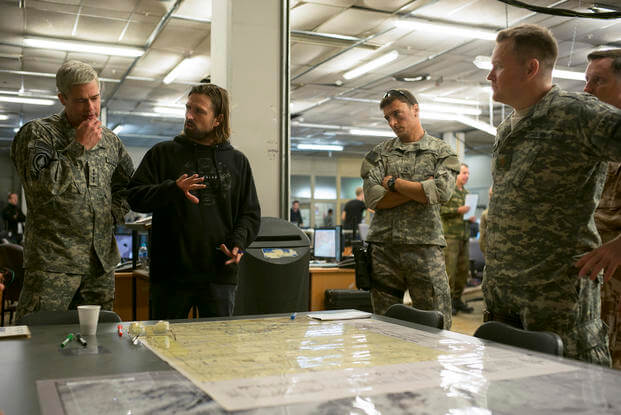
We’re having this conversation a couple of weeks after the movie was released on Netflix. What kind of reaction are you hearing?
I tend to shut myself off from the ways in which the things I make land in the world. When I made my first movie, I tracked its progress quite closely, and I ultimately found that to be an incredibly unhealthy experience. I started to build an image of myself based on what is being said about me and the movie. Everything about that just feels toxic.
Ever since then, I kind of shut myself off a little bit, but what I have gleaned from this one has been really strange. The movie seems to be wildly divisive; and not necessarily in the ways that I had anticipated it would. I originally anticipated that it would be divisive just because it's about war and it's an anti-war film in a time when we don’t seem to make anti-war films anymore.
If anything, it's actually the form of the movie that seems to be divisive. In simple terms, if you surrender to Brad's performance and the size of it and the wildness of it, then you experience the movie as wild and bold. But if that performance and that character rubs you the wrong way, then you experience the movie as a giant mistake.
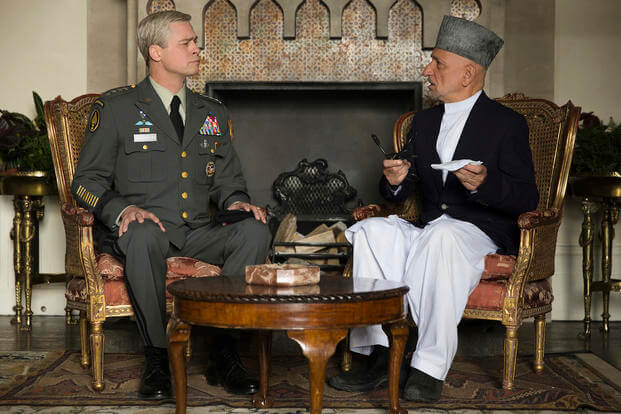
One thing that’s interesting to me about the movie versus Michael Hastings' book is that ultimately there's a lot of empathy for General Glen McMahon. The movie is actually understands his beliefs and his principles in a way that doesn’t match the way Michael Hastings felt about General McChrystal.
I wonder. One of the great tragedies of Michael's death for me was simply the fact that I never got to meet him. I never got to talk to him about his experiences beyond the words on the page. I never got to talk to him about what his experiences of Stan McChrystal were.
I have this strange belief that, even though what he wrote was so damaging to McChrystal's career, that Michael would have had, on some level, some kind of admiration for him. I think it was clear in Michael's writing, at least, that Stan McChrystal is a complex guy. Even in just his acknowledgement of how McChrystal was admired, if not revered, by his men, that’s a testament to the fact that these figures are complex guys.
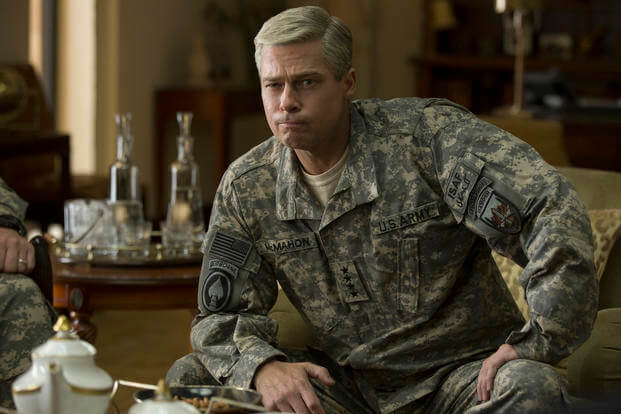
I think you’ve pulled off a difficult thing in this move. You don’t hesitate to push the farce and satire and yet Brad's performance is not a cartoon. If the viewer is buying in, there's a humanity to Glen McMahon in the middle of the circus that’s going on in the film.
That was always very important to me. In making any movie, the first and most important thing for me is that I find the human way in. I love the idea of creating a character who seemed like a caricature because of his hubris, but that viewers would ultimately begin to experience as a human being. On some level, you come to understand where that hubris might come from.
You first start to see the cracks beneath the hubris when he meets up with his wife in Paris. She is the person who mostly clearly sees the human being underneath the bravado. From that point on, you start to see the ways in which the entire endeavor is built upon a kind of fragile humanity.
I often wonder what Stan McChrystal makes of his experiences in Afghanistan now that he has had time to reflect upon it. There's something about that kind of conviction that makes it incredibly difficult, not only to see what you're doing as folly while you're doing it, but makes it also difficult to see it as folly years later as well. We all feel like we're defending our legacy, whatever that is.

Most of the initial press about the film was about Brad Pitt premiering a movie on Netflix and whether we would know if it has a “hit.” Now that regular people have had a chance to see the movie, there seems to be a lot of interesting discussion going on. For example, our staff has been hearing from people who served in Afghanistan that you’ve nailed the absurdity of so much of what goes on there.
People who've actually had the experience seem to understand what you're up to more than people who want to define it as being a movie with a particular political point of view.
I was frustrated that everyone wanted to write about it being a Netflix film. I’m proud as I am of the movie because I love how wild and crazy it is, but the wildly divisive tenor of its reception had started to make me feel like it was just sort of disappearing. The thing that caused me the greatest sadness was I've spent three years plus of my life working on this movie and I actually believe that, underneath its absurdity, it actually has something very important to say. The idea that it might not even spark a conversation in the places that count was causing me considerable sadness.
When I heard on the New York Times podcast that everybody at the Pentagon are talking about the film, I found that quite profoundly gratifying.
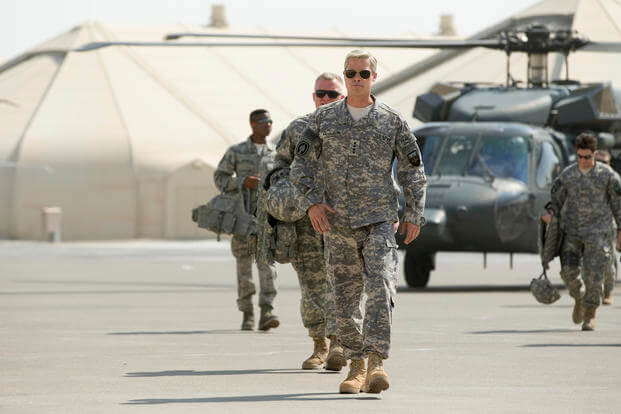
You’ve got a real chance to reach a far larger audience than you would have if “War Machine” opened in a few hundred theaters for a couple of weeks and maybe eventually made it to TV or a streaming service. It’s available for people all over the world right away and it’s always going to be streaming on Netflix. You’ve got a chance to reach a much larger audience. Not everyone who subscribes to Netflix watches a new movie in the first couple of weeks. Anyone who sees the movie and talks about it at work or school the next can create new viewers for months or even years to come. And they can watch it more than once.
I would love for that to happen. I would love for it to be the kind of movie that people watch multiple times. Whatever experience people are having with the strange discombobulation of the size of Brad's character and the performance was something that I was experiencing back even when we were making it. When we were cutting it, people who hadn’t been part of the project from the beginning were saying, “Wow, I wasn’t expecting it to play like this.”
But they almost invariably came around, not only to surrender to Brad’s performance, but to love it. That made me realize that the challenge for us was trying to frame it in a way that made the first viewing not too discombobulating. On some level, that may have been too great a challenge.
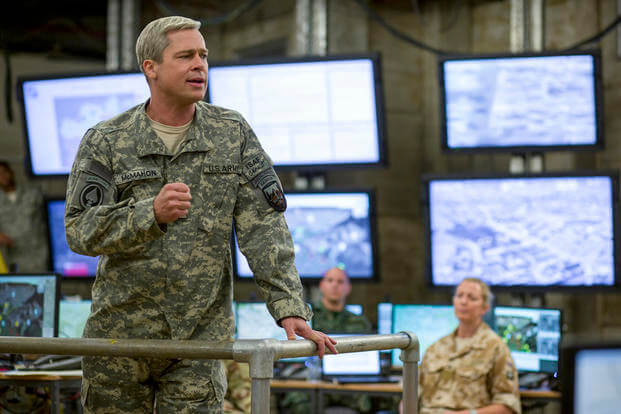
People aren't used to seeing a familiar face, a movie star, do something that’s risky, I guess, in the way people's career are so stage-managed at this point. It's a little bit off-brand for Brad.
I’ve heard that as well. When I went into this movie, the first thing that excited me, knowing that I was writing the script for Brad, was the idea of building a character for him that would allow him to employ those skills that he displayed, so dexterously in Burn After Reading and Inglourious Basterds. In some ways, those are my favorite Brad performances. I think he's a wonderfully gifted comedic clown. I loved the idea of writing a character for him in which he'd get to do that stuff, but in a leading role. But yeah, but I guess there is a different Brad Pitt brand that I've violated.
This movie may not be for everyone, but I’ve got a feeling that it’s one that will stick with me for a long time.
When I think about the movies that I love, when I think about so much of the art that I love, it's always stuff that struck me as odd the first time I experienced it and then grew to love more and more the more I immersed myself in it. Quite often, the things that I just loved unquestioningly straight away from the outset are the things I get bored of the quickest because they are, on some level, usually just a facsimile of stuff that I've seen before.
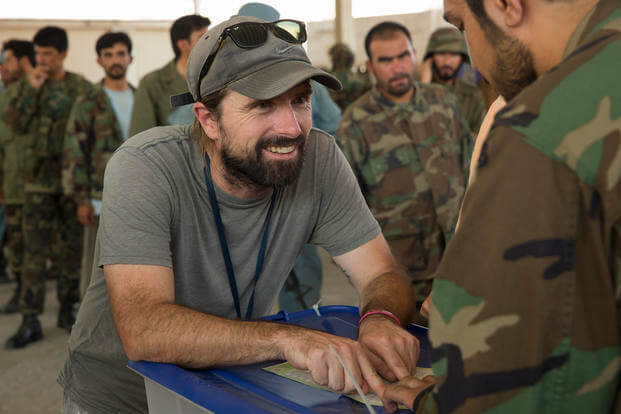
There's so much joy in your movie. “We got the keys to the car and we're gonna do donuts in a parking lot.”
I like that. That’s what it felt like. I felt exhilarated when we were making the movie because I felt like we were making a movie that was unusual, that didn’t feel like other movies. But you know there's always the risk you run when you're doing that.
Making movies feels like an enormous privilege. I get to completely immerse myself in what feels like somebody else's life for a few years. I get to pull it apart and have a look at it and tinker with it a little bit and then move on to something else. All of it is just a great unraveling of the human experience, but it's such an enormous privilege.
In making this film, I regularly had those moments of talking to guys who had served, intimate conversations about their experiences and then I found myself flying up and down the coast of the UAE in Black Hawk helicopters. This stuff is extraordinary and I get to do this for a living.
If you haven't seen "War Machine" yet, check out the trailer:
%embed2%
